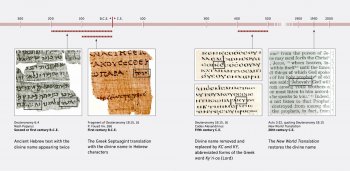Aunty Jane
Well-Known Member
Wow....did you not know that the Jewish disciples of Jesus did know the divine name and most likely used it, especially in their worship.I meant that since, as you say, had the Jews retained the Divine Name we would not be having this discussion, the problem with this argument being that the apostles were Jews. If there was indeed a problem with understanding things properly, wouldn't they have fixed it themselves? Because they didn't. They continued to use κυρίος in all sorts of contexts where, as JWs try to argue, the word is referring to Jehovah one instant and Jesus the next.
When Jesus picked up the scroll of Isaiah and read it aloud in the synagogue, he read...
Isaiah 61:1-2...
“The spirit of the Sovereign Lord Jehovah is upon me,
Because Jehovah anointed me to declare good news to the meek.
He sent me to bind up the brokenhearted,
To proclaim liberty to the captives
And the wide opening of the eyes to the prisoners,
2 To proclaim the year of Jehovah’s goodwill
And the day of vengeance of our God,
To comfort all who mourn.”
Jesus having said in John 17:6...“I have made your name manifest to the men whom you gave me out of the world. They were yours, and you gave them to me, and they have observed your word.”
And having said in the Lord’s Prayer that God’s name be “hallowed”, it was very evident that God’s name was to be held in high esteem.....not buried in human tradition and superstition.
Ancient manuscripts in Greek have been found with the Hebrew Tetragrammaton in the Greek text.

This is why the NWT replaces God’s name in every instance where it had been substituted in the OT and with with “Kyrios”, even in the Greek NT because, when the apostles quoted OT scripture, they would have contained the divine name.
Jehovah is not a nameless God....he never was.
“Then God said once more to Moses:
“This is what you are to say to the Israelites, ‘Jehovah the God of your forefathers, the God of Abraham, the God of Isaac, and the God of Jacob, has sent me to you.’ This is my name forever, and this is how I am to be remembered from generation to generation.” (Exodus 3:15)
If the Jews had obeyed their God and retained God’s name “forever” as they were instructed, then no trinity would ever have been possible. There would always have been a clear distinction between the “Sovereign Lord Jehovah” and the “Lord Jesus Christ”. (1 Corinthians 8:5-6)



 :
: